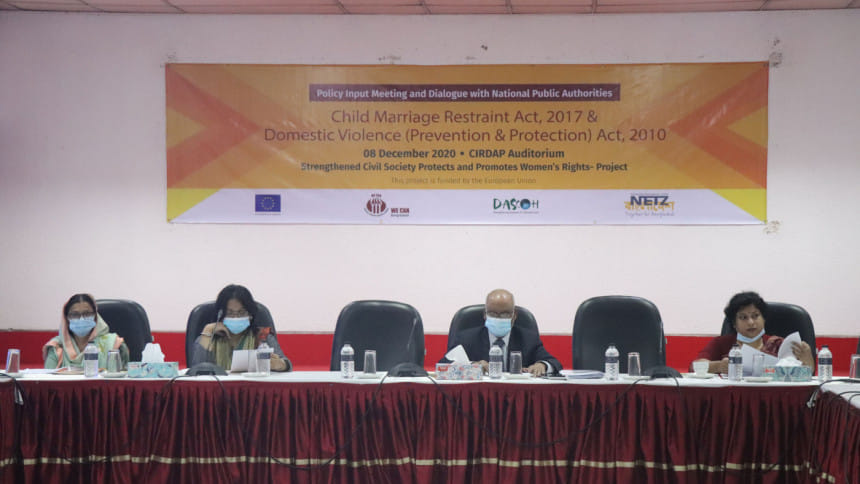Proper implementation of law is needed to stop child marriage and domestic violence

NETZ Partnership for Development and Justice, along with it partner organisations We Can and DASCOH Foundation jointly organised a Policy Dialogue with relevant public authorities on the progress and obstacles of the implementation law on 08 December at CIRDAP Auditorium, Dhaka under the project titled Strengthened Civil Society Protects and Promotes Women's Rights financial supported by the European Union. Representatives from the relevant government ministries, local governments and academicians and regional and local CSO members joined the policy dialogue.
The meeting shared the findings and recommendations of a study entitled "Domestic Violence and Child Marriage: An Inter-locked Tragedy in Women and Girls Life in Bangladesh" conducted by Rabeya Rawshan, Senior Consultant and Mohammad Golam Sarwar, Lecturer, Department of Law, University of Dhaka. The study has consulted local and regional civil society organisatiosn (CSOs) and documented their policy inputs in relation to implementation of DVA and CMRA and existing gaps in the implementation process.
The study shows that the societal structure influenced by embedded traditions and culture creates impediments towards the implementation of CMRA. The malpractice by lawyers facilitates child marriages through affidavits that have been treated as an accepted norm though they have no legal effect. These irregularities not only bypass the actual implementation of law but also create an extra-legal culture which seriously hampers the social fabric. The in-depth analysis of the CMRA shows that considering the social context of Bangladesh where the awareness against child marriage is still under-developed, the special provision under CMRA may be used to justify child marriage. Though Child Marriage Restraint Rules provides an explanation about the application of special provision, the practical evidence suggests that the assessment committee required to implement the special provision does not exist at the Upazila Level. Even the members of the Assessment Committee are not aware of their roles and responsibilities to actualize the functioning of assessment committee. Though there is a provision to cancel the license of Nikah register if found irregularities, the local representatives are mostly remained unaccountable.
Researchers also presented the frustrating finding regarding the DVA reveals that the Act is rarely exercised by the common people. The infrastructural requirements including establishment of safe home and appointment of enforcement officer are also missing in the research areas. In some cases, though the domestic violence cases are resolved through the interventions of Upazila/Union chairmen or members, however, their decisions remain questionable without being objective and unbiased.
Dr. Abul Hossain, Project Director, Multi-Sectoral Programme of Violence Against Women of Ministry of Women and Children Affairs said civil societies, government agencies and development organisations must work together for the proper implementation of laws. There are structural barriers to the implementation of laws which must be properly evaluated and proper steps need to be taken in order to overcome them.
Laila Jesmin Banu, Programme Manager of European Union said corruption at all levels must be curbed in order to prevent child marriage and domestic violence. All stakeholders starting from family, human rights workers, government officials, development workers and public representatives must build awareness regarding these issues.
Irfat Ara Iva, Programme Analyst of UN Women said that birth registration must be ensured to prevent child marriage. To ensure safe movement of women, the risk factors must be identified. Furthermore, the laws must be translated into an easy-to-understand format and must be communicated with the masses.
Zobaida Nasreen, Associate Professor, Department of Anthropology, University of Dhaka said that instead of provisions of fines, there must be provisions of imprisonment. The penalties for child marriage must be extensively publicised. Steps should be taken to curb practices such as marital rape and dowry.
Sabina Sultana, Senior Program Officer, Multi-Sectoral Programme of Violence Against Women of Ministry of Women and Children Affairs said that the prevalent perceptions regarding women must be changed. There are many activities of the MoWCA including the one-stop-crisis centers at upazila nad district level and the hotline number for violence against women.
Akramul Haque, CEO, DASCOH said education of girl children must be ensured to prevent child marriage.
Additionally, speakers said that most of the women are not interested in taking legal action. A combined and comprehensive initiative is necessary to prevent any kinds of violence against women. The following recommendations were made:
- The implementing stakeholders must be efficient.
- The provision on separate register for domestic violence cases must be implemented.
- The provision on effectuating the penalty within two years of child marriage should be brought within the jurisdiction of the mobile courts.
- Notaries should be prevented from providing false certificates for the prevention of child marriage.
- The Union and Upazila Women Affairs Officer must take proper steps for the establishment of Child Marriage Prevention Committees.
- An online database should be maintained to track incidence of child marriage.
Event covered by Law Desk.

 For all latest news, follow The Daily Star's Google News channel.
For all latest news, follow The Daily Star's Google News channel. 



Comments